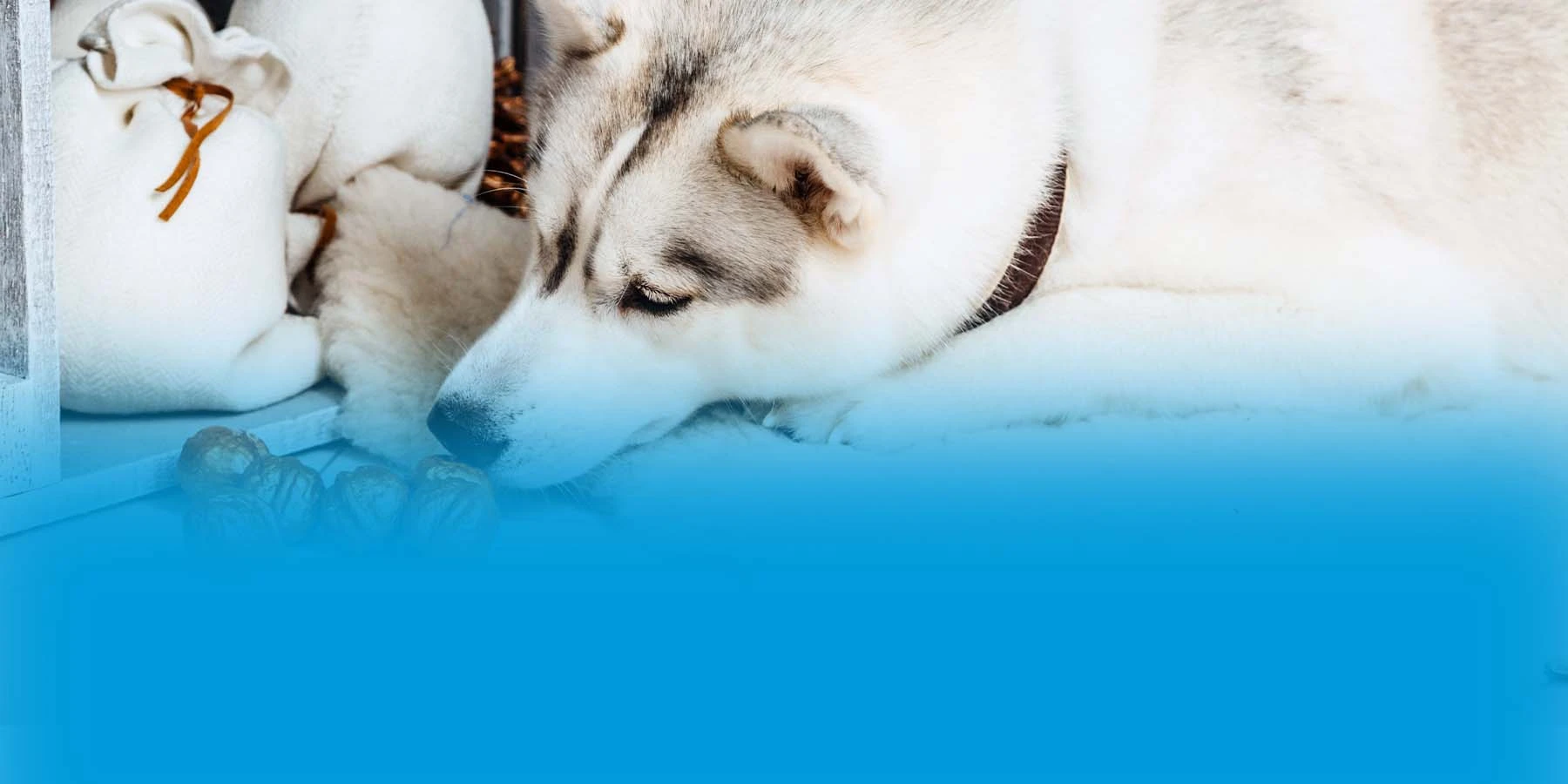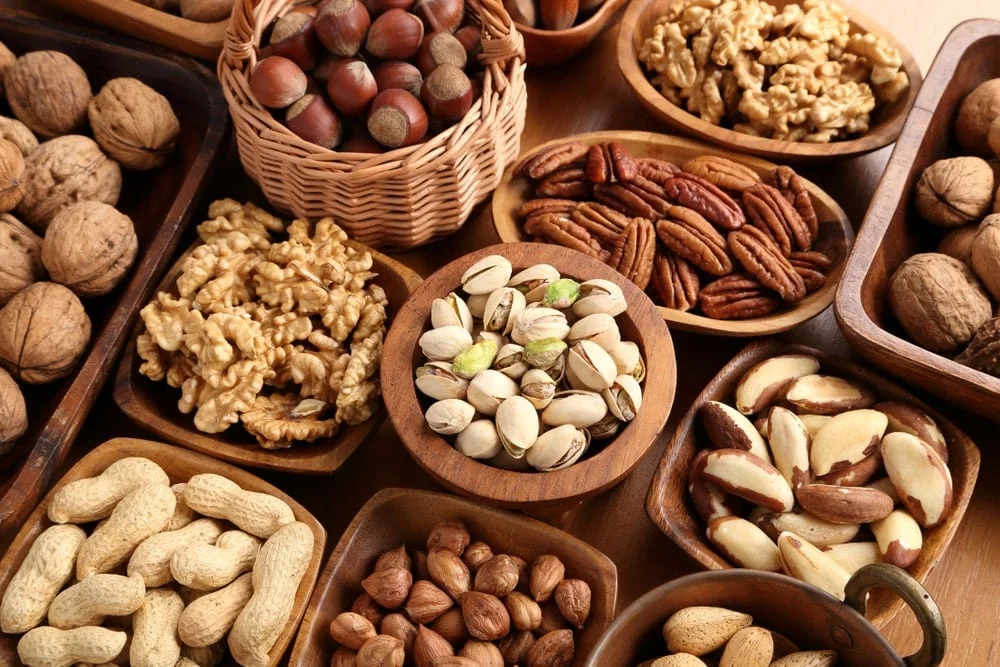PET HEALTH
Can Dogs Eat Nuts? A Guide On The Various Nuts Your Dog Can Eat
Salty, sweet, and crunchy: nuts are a go-to snack for humans and have been a staple in our diets for centuries. So it begs the question: if our dogs have been walking beside us for 10,000 years, can dogs have nuts? The answer is sometimes yes and sometimes no. We’ve put together a quick guide on what nuts are a “yes” and which nuts are a hard “no.”
Are Nuts Bad for Dogs?
Nuts aren’t inherently bad for dogs, but too much of a good thing can harm your pup. Nuts can be a safe option as long as the nuts are free of mold, low in sodium, and don’t have any additives like garlic or onions. But there are several reasons why you may not want to feed your dog nuts on a regular basis.
Risk of pancreatitis
Pancreatitis is the inflammation of the pancreas that can be caused by a high-fat diet, which often includes nuts.³ It is an unfortunately common condition that can be fatal. Avoid adding nuts to your dog's diet if they are obese or predisposed to weight gain. The signs of pancreatitis, like diarrhea and weakness, often mimic other conditions which make it difficult to catch until the symptoms are severe. If you suspect your pet has developed pancreatitis, call your veterinarian immediately.
Gastrointestinal issues
Dogs don’t chew their food as well as humans do. Their teeth and saliva aren’t like ours, which means your dog can scarf down their meals because digestion starts in their stomachs instead of their mouths.⁴ However, nuts have tough exteriors, so they may clog up their intestines, leading to an expensive visit to the veterinarian. Avoid letting your dog indulge in large amounts of nuts, especially small nuts or nuts with shells.
Potential allergens
As odd as it sounds, dogs can be allergic to food just like us! Nut allergies in dogs are uncommon, but not unheard of.⁵ Monitor your dog closely for signs of an allergic reaction when you introduce nuts into their diet. Signs of allergies in dogs include things like:
● Coughing
● Bald patches, skin rashes, or skin infections
● Obsessive licking
● Face rubbing
● Paw biting or inflamed paws
● Wheezing
If you notice any of these symptoms in your dog, consider scheduling an allergy test with your vet. Worried about the cost? MetLife’s1 dog insurance may cover the cost of these tests and any medications your veterinarian may prescribe.2
What Nuts Can Dogs Eat?
With all this in mind, you may find that nuts may be a good treat option for your dog. Nuts can provide variety to your dog’s diet and add nutritional value such as:⁶
● Protein for healthy muscles
● Arginine, an amino acid critical for blood circulation
● Healthy fats to support cholesterol regulation
● Fiber that supports digestion
● Vitamin C for better immune health
● Vitamins B1 and B12 to counter fatigue and regulate appetite
Keep your dog’s lifestyle, breed, size, and health in mind when making choices about what your dog eats.⁷ Only give your dog nuts that are low in sodium and do not contain chocolate or other toxins. Here are the common nuts we eat and their safety for dogs. Please consult your vet before you incorporate anything new into your dog’s diet.
Can dogs eat almonds?
Almonds aren’t toxic to dogs, but they aren’t recommended due to their high fat content and their potential choking hazard. If your dog is small or toy-sized, the almond may be too big for the dog’s windpipe or throat. Avoid feeding your dog almonds in excess.
Can dogs eat peanuts?
Yes, you can share some peanuts with your dog. You may even consider giving your dog peanut butter when they have to take medication. An occasional peanut is okay for most dogs. Just be sure the peanuts are free of salt or other seasonings.
Can dogs eat pistachios?
Pistachios won’t necessarily harm your dog, but they aren’t the best option due to their high-fat content. Pistachio shells can be hazardous to most dogs because they can tear their intestines, and some pistachios can carry toxic mold. Inspect the nuts for mold and take the shells off if you choose to share.
Can dogs eat cashews?
Cashews are a firm yes! In moderation, cashews can be a fun snack for your dog. Choose cashews that are salt-free or low in sodium to avoid potential salt poisoning due to excess sodium in your dog's diet.⁸
Can dogs eat walnuts?
There are many varieties of walnuts. English Walnuts are the most common variety on the market because it is a great addition to baked goods and salads. These are safe for your dogs to eat in moderation.⁶ However, black walnuts are very toxic to dogs.⁹ Double check the packaging if you are unsure what variety of walnuts you have.
Can dogs eat pecans?
Pecans are safe as long as they are free of mold.⁶ Mold poisoning is an overlooked safety hazard and, in excess, can cause seizures and nerve damage in dogs. Throw moldy food away immediately and call poison control if you think your dog got into moldy nuts.
Can dogs eat hazelnuts?
Hazelnuts aren’t toxic to dogs. However, like walnuts, hazelnuts have a tough exterior. Consider chopping these up before sharing with your dog to avoid choking.
Can dogs eat chestnuts?
Roasted chestnuts go along with winter like pumpkins and apples. All three are safe for your dog to eat as long as they’re plain and not spiced or seasoned! Simply cook the chestnuts or chop them up for your dog so they don’t choke, then snuggle on the couch.¹⁰
Can dogs eat Brazil nuts?
Brazil nuts are another yes! Brazil nuts are safe in small quantities. Like other nuts, make sure they are free of salt and flavorings.
Can dogs eat macadamia nuts?
No. This is one nut that you should avoid giving to your dog. Macadamia nuts are toxic to dogs causing leg weakness, vomiting, and diarrhea. According to the ASPCA, most negative effects can be managed at home with guidance from your vet.¹¹ Keep these nuts away from your dog along with any baked goods or creamers flavored with the nuts.
Keep a List of Nuts Dogs Can Eat
It can be difficult to know what nuts are bad for dogs. The great news is that there are a variety of nuts that are safe for dogs. Sometimes they can add beneficial nutrients to your dog's daily diet in moderation. Armed with this information, you can probably introduce nuts into your dog’s treat rotation with your vet’s guidance.
MetLife Pet Insurance plans could cover accidents if your pup overindulges in nuts.² Overconsumption of nuts can turn into costly veterinary visits. We could help save you money in medical expenses.


